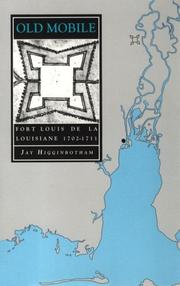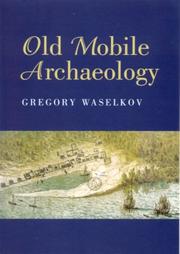| Listing 1 - 10 of 25 | << page >> |
Sort by
|

ISBN: 0817390979 0585368090 9780585368092 9780817390976 0817305289 9780817305284 Year: 1991 Publisher: Tuscaloosa, Ala. University of Alabama Press
Abstract | Keywords | Export | Availability | Bookmark
 Loading...
Loading...Choose an application
- Reference Manager
- EndNote
- RefWorks (Direct export to RefWorks)
Southwest, Old --- Mobile (Ala.) --- History.
Digital
Year: 1823 Publisher: [Mobile, Ala.?] Mobile Argus Office
Abstract | Keywords | Export | Availability | Bookmark
 Loading...
Loading...Choose an application
- Reference Manager
- EndNote
- RefWorks (Direct export to RefWorks)
Book
ISBN: 1612006329 9781612006321 9781612006314 1612006310 Year: 2018 Publisher: Philadelphia, PA
Abstract | Keywords | Export | Availability | Bookmark
 Loading...
Loading...Choose an application
- Reference Manager
- EndNote
- RefWorks (Direct export to RefWorks)
It has long been acknowledged that General Robert E. Lee's surrender of the Army of Northern Virginia ended the civil war at the Battle of Appomattox in April 1865. However, the often overlooked last siege of the war was the Mobile campaign, crucial to securing a complete victory and the final surrender of the last Confederate force east of the Mississippi River. The Last Siege explores the events surrounding this siege and capture of Mobile, Alabama. The Union victory at the battle of Mobile Bay in 1864 ended blockade running from the port of Mobile. Uncaptured, the city remained a priority for the Confederates to defend and the Federals to attack. This book gives a new perspective on the strategic importance of Mobile as a logistical center which had access to vital rail lines and two major river systems, essential in moving forces and supplies. Included are the most detailed accounts ever written on Union and Confederate camp life in the weeks prior to the invasion, cavalry operations of both sides during the expedition, the Federal feint movement at Cedar Point, the crippling effect of torpedoes on U.S. naval operations in Mobile Bay, the tread-way escape from Spanish Fort, and the evacuation of Mobile. The entrance of Federals into the city and the reaction of the citizenry are featured. In doing so evidence is presented that contradicts the popular notion that Mobile wholeheartedly welcomed the Federals and was a predominately pro-Union town. Using a variety of primary sources, this book highlights the bravery of the men who were still trying to win by utilizing evolved military tactics against the strong defensive fortifications at Mobile. Many acts of heroism occurred in this, the Confederacy's last campaign which ended in the final surrender at Citronelle, Alabama in May.
Mobile (Ala.) --- Alabama --- United States --- History --- Campaigns
Periodical
Year: 1834 Publisher: Mobile, Alabama : John Forsyth, Jr.
Abstract | Keywords | Export | Availability | Bookmark
 Loading...
Loading...Choose an application
- Reference Manager
- EndNote
- RefWorks (Direct export to RefWorks)
Mobile (Ala.) --- Mobile County (Ala.) --- Alabama

ISBN: 0817384731 9780817384739 9780817351861 0817351868 0817351868 Year: 2005 Publisher: Tuscaloosa University of Alabama Press
Abstract | Keywords | Export | Availability | Bookmark
 Loading...
Loading...Choose an application
- Reference Manager
- EndNote
- RefWorks (Direct export to RefWorks)
An archaeological guide to the earliest French settlement on the northern Gulf Coast. Archaeological excavations since 1989 have uncovered exciting evidence of the original townsite of Mobile, first capital of the Louisiana colony, and remnants of the colony's port on Dauphin Island.
Excavations (Archaeology) --- French --- Antiquities. --- Mobile (Ala.) --- History.
Year: 1935 Publisher: [Washington, D.C.] : National Archives and Records Administration,
Abstract | Keywords | Export | Availability | Bookmark
 Loading...
Loading...Choose an application
- Reference Manager
- EndNote
- RefWorks (Direct export to RefWorks)
Periodical
Year: 1841 Publisher: Mobile [Alabama] : Sanford & Wilson
Abstract | Keywords | Export | Availability | Bookmark
 Loading...
Loading...Choose an application
- Reference Manager
- EndNote
- RefWorks (Direct export to RefWorks)
Mobile (Ala.) --- Mobile County (Ala.) --- Alabama
Periodical
Year: 1841 Publisher: Mobile [Alabama] : Sanford & Wilson
Abstract | Keywords | Export | Availability | Bookmark
 Loading...
Loading...Choose an application
- Reference Manager
- EndNote
- RefWorks (Direct export to RefWorks)
Mobile (Ala.) --- Mobile County (Ala.) --- Alabama
Periodical
Year: 1834 Publisher: Mobile, Alabama : John Forsyth, Jr.
Abstract | Keywords | Export | Availability | Bookmark
 Loading...
Loading...Choose an application
- Reference Manager
- EndNote
- RefWorks (Direct export to RefWorks)
Mobile (Ala.) --- Mobile County (Ala.) --- Alabama
Book
ISBN: 9780062748201 0062748203 9780062864369 006286436X Year: 2018 Publisher: New York, NY Amistad, an imprint of HarperCollins Publishers
Abstract | Keywords | Export | Availability | Bookmark
 Loading...
Loading...Choose an application
- Reference Manager
- EndNote
- RefWorks (Direct export to RefWorks)
"In 1927, Zora Neale Hurston went to Plateau, Alabama, just outside Mobile, to interview eighty-six-year-old Cudjo Lewis. Of the millions of men, women, and children transported from Africa to America as slaves, Cudjo was then the only person alive to tell the story of this integral part of the nation's history. Hurston was there to record Cudjo's firsthand account of the raid that led to his capture and bondage fifty years after the Atlantic slave trade was outlawed in the United States. In 1931, Hurston returned to Plateau, the African-centric community three miles from Mobile founded by Cudjo and other former slaves from his ship. Spending more than three months there, she talked in depth with Cudjo about the details of his life. During those weeks, the young writer and the elderly formerly enslaved man ate peaches and watermelon that grew in the backyard and talked about Cudjo's past--memories from his childhood in Africa, the horrors of being captured and held in a barracoon for selection by American slavers, the harrowing experience of the Middle Passage packed with more than 100 other souls aboard the Clotilda, and the years he spent in slavery until the end of the Civil War. Based on those interviews, featuring Cudjo's unique vernacular, and written from Hurston's perspective with the compassion and singular style that have made her one of the preeminent American authors of the twentieth-century, Barracoon masterfully illustrates the tragedy of slavery and of one life forever defined by it. Offering insight into the pernicious legacy that continues to haunt us all, black and white, this poignant and powerful work is an invaluable contribution to our shared history and culture."--Publisher's website.
Enslaved persons --- West Africans --- Slave trade --- Slavery --- Slave ships --- History --- Lewis, Cudjo --- Clotilda (Ship) --- Mobile (Ala.)
| Listing 1 - 10 of 25 | << page >> |
Sort by
|

 Search
Search Feedback
Feedback About UniCat
About UniCat  Help
Help News
News